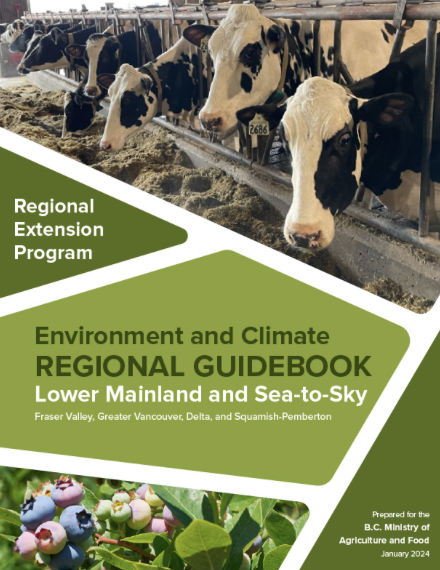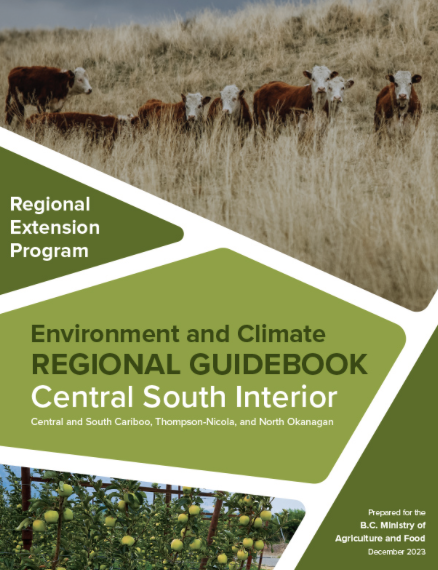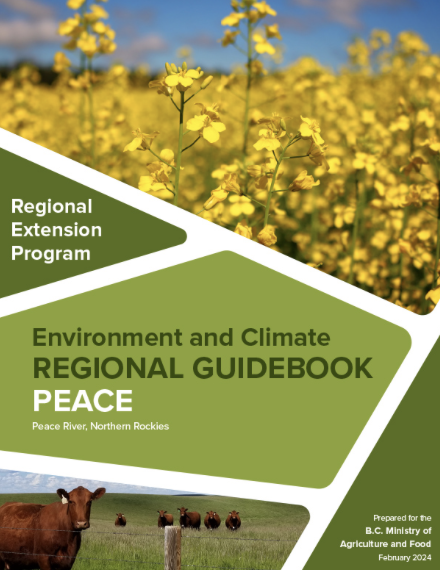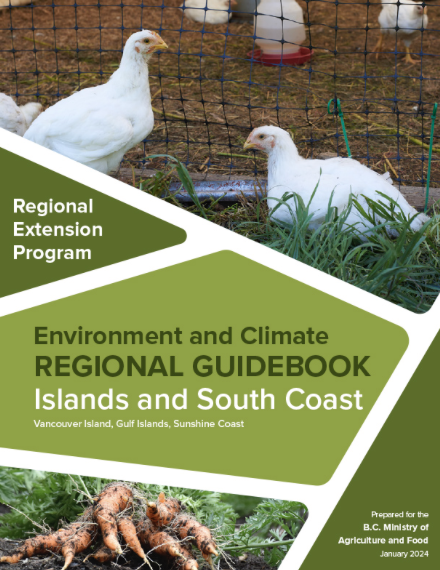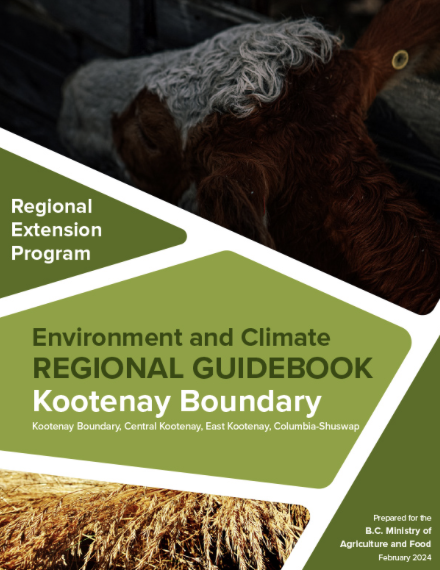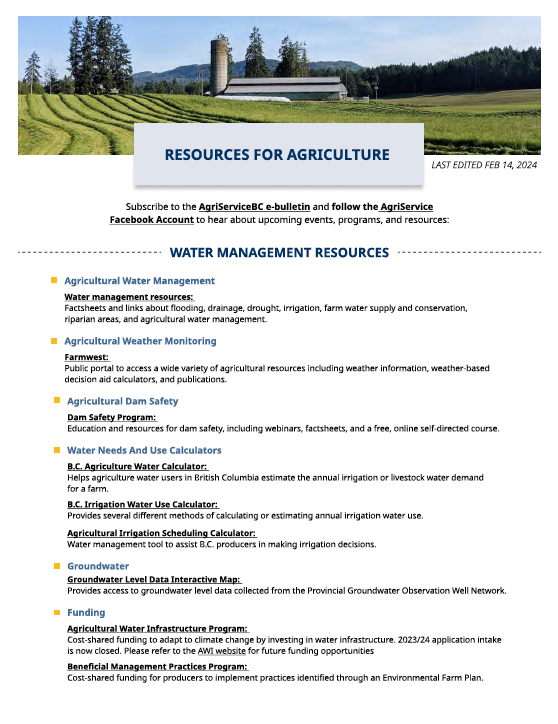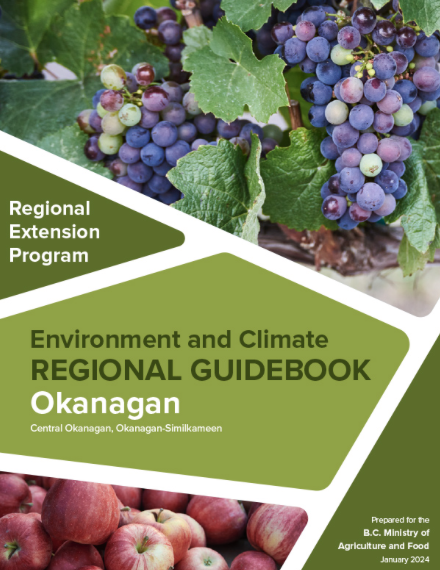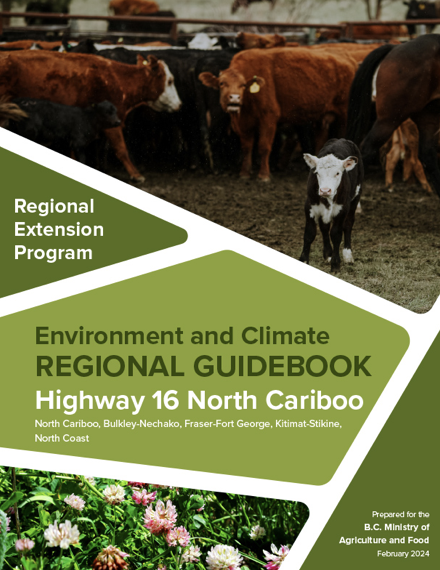WATER, SOIL, CLIMATE
Research and resources for BC farmers
February 27-29, 2024
This online workshop explored how we can to adapt to the climate change challenges facing the agriculture sector. We heard from those working on the ground and learned about the research and programs emerging to support BC farmers.
Key topics included:
- The scope, opportunities and projects of the new Regional Extension program launched by the BC Ministry of Agriculture & Food
- Decision making and regional approaches to adapt to drought and drier conditions
- Applied research and cover cropping resources to build soil health on BC farms
- Career and training opportunities in the BC agricultural sector, from agrology and agritech to government trainings and program delivery
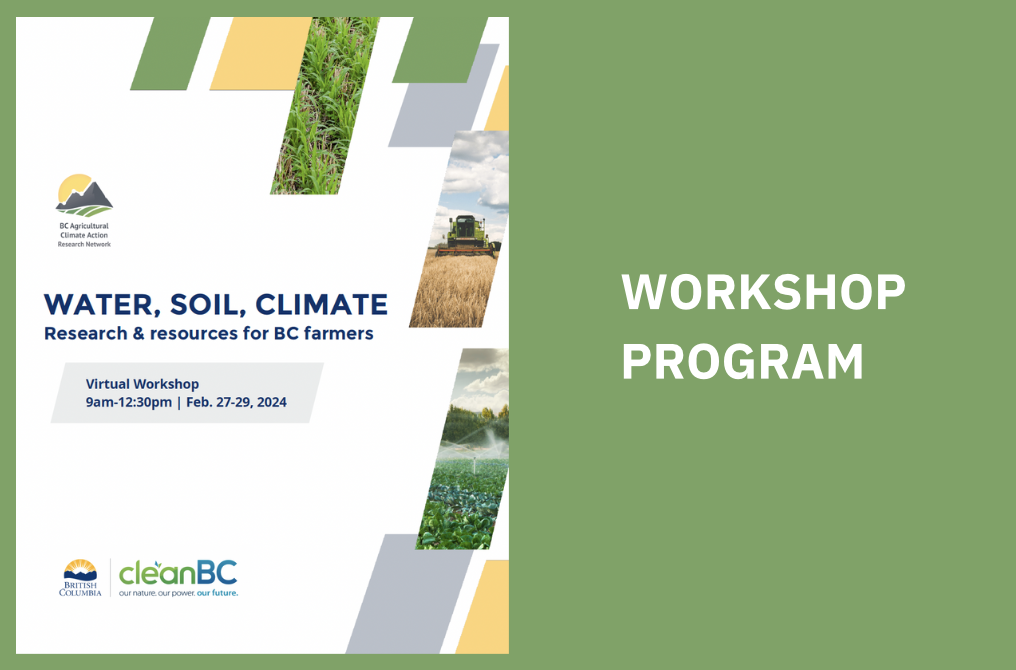
Resources
A suite of resources that are complementary to the water, soil, and extension topics explored in workshop sessions includes:
- Guidebooks – Environment and Climate Regional Guidebooks from the BC Ministry of Agriculture and Food’s Regional Extension Program
- Handout – Resources for Agriculture: Water and soil management tools and information
- Links – Session specific resources (explore the links in the workshop agenda and program)
Backgrounder | About the Resources
As part of the B.C. Ministry of Agriculture’s new Regional Extension Program, producers across the province were consulted on regional climate adaptation and mitigation priorities. Top issues, response strategies, and feasibility of practices differ across British Columbia’s seven agricultural regions, highlighting the need for targeted extension and applied research projects. In Fall 2023, BC ACARN compiled producers’ priorities and past/current extension and applied research projects for each provincial extension region, and developed seven regional guidebooks. Content serves as key context for the rollout of the BC Ministry of Agriculture and Food’s Regional Extension Program.
These resources aim to provide organized content for producers, on-the-ground researchers, and consultants to reflect on the priority climate issues challenging environmental sustainability, local farm businesses, and food production. Each priority issue described in a regional guidebook includes:
- An overview of the priority and why it is important to producers in the region
- An inventory of past and current applied research and extension projects relevant to the issue
- Beneficial management practices and work that can be built on to address specific priority areas
- Current funding programs associated with each priority area
- Current provincial tools
3 Day Virtual Workshop
Click on the session titles below to open the webinar recordings or visit the workshop playlist on ACARN’s Youtube channel.
Delivering regional extension in BC
8:45-10am WEBINAR
🎥 Workshop welcome and introduction to BC’s new Regional Extension program
The BC Ministry of Agriculture and Food’s new Regional Extension Program aims to increase on-farm adoption of management practices that support producers in making their operations more climate resilient, sustainable, and economically viable.
In this session learn more about the roll out of the Regional Extension program, and the targeted applied research and extension projects which will begin in 2024. Learn more about the producer-identified priorities the projects will be addressing and how the program is designed to respond to contexts and challenges across BC’s diverse agricultural regions.
Presented by: Michelle Koski, Assistant Deputy Minister & Angeli dela Rosa, Team Lead, Environment and Climate Programs, BC Ministry of Agriculture and Food
Moderator: Shauna MacKinnon, Network Manager, BC ACARN
Resources
- More information on the BC Ministry of Agriculture & Food’s Regional Extension program
10:15-11:15am WEBINAR
🎥 Regional extension in action: Project showcase
This session introduces two examples of collaborative work leading to decision support tools that help producers make more informed management decisions as they navigate changing conditions.
- The Landscape and Range Resiliency Planning Tool is a climate change modeling and surface water risk assessment tool, incorporating a Crown forage productivity database. As climate change reduces water availability, tools that integrate climate modeling are essential for planning for today and into the future. The tool can assist with land-use planning discussions that focus on the interactions of range use with forestry operations, intensive grazing plans, wildlife interactions, wildfire management, agroforestry strategies, cut-block seeding strategies, and land-based investment opportunities.
Presented by: Andrew Pantel, Pantel Environmental Consulting - The Delta Water and Salinity Monitoring Program was established to address the irrigation water challenges faced by Delta farmers. As climate change contributes to more extreme and unpredictable weather, the flow of the Fraser River, the main source of irrigation water in Delta, is also being affected. This is leading to fluctuating salinity concentrations that, when elevated, can be toxic to crops. In 2016 the Delta Farmers’ Institute initiated a project to address this issue and have since launched an expanded monitoring program for local farmers to access real-time water and weather information. The success of this program can serve as a model for other regions, demonstrating how monitoring and visualization platforms can support farmers in decision-making and climate risk management.
Presented by: Andrew Nadler, Peak HydroMet Solutions
Resources
- Learn more about the Delta Water and Salinity Monitoring Program and link to the dashboard tool. Project reports and factsheets are available on the Delta Farmers’ Institute salinity and water monitoring program project page.
- Reports, maps and the Landscape and Range Resiliency Planning tools are available on the Climate-resilient livestock surface water in the Cariboo project page of the BC Climate Change Adaptation Program website
11:30am-12:30pm DISCUSSION
🎥 How farmer focused collaborative research can meet local needs
David Catzel, BC Seed Security Program Manager at FarmFolk CityFolk looks into how farmer-partnered variety trials are playing a critical role in improving climate resilience in vegetable production—from supporting new crop choices to breeding the locally adapted, climate resilient varieties of the future.
After the short presentation, participants will join small groups to share experiences and ideas for collaborative on-farm research trials that meet local needs.
Presented by: David Catzel, BC Seed Security Program Manager, FarmFolk CityFolk
Moderated by: BC Agricultural Climate Action Research Network
Resources
- Learn more about the BC Seed Security Program at FarmFolk CityFolk
- Learn more about the Canadian Organic Vegetable Improvement (CANOVI) project
Adapting to drought and drier conditions
9am-10am WEBINAR
🎥 Water regulation and drought management decisions in agriculture
This session offers those working in, or with, the agriculture sector a better understanding of the current policy, regulatory frameworks and decision making processes guiding drought response in BC. The session will be co-presented by the BC Ministry of Water, Land and Resource Stewardship and the BC Ministry of Agriculture and Food as they are working closely on drought management.
Presented by: Ray Reilly, Drought Response Coordinator, Ministry of Water, Land and Resource Stewardship and Tara Despault, Water Resource Specialist, BC Ministry of Agriculture & Food
10:15am-11:15am WEBINAR PANEL
🎥 Local response to water management in four regions of BC
Hear from representatives from four regions of BC experiencing drought and drier conditions. Each panelist brings a unique perspective with experience ranging from the City of Delta where the municipality is spearheading investments in agricultural water infrastructure to Vancouver Island, the Kootenay-Boundary and Lake Country in the Okanagan. This panel sparks new ideas and thoughtful conversation on a defining issue across the province.
Panelists: Harvy Takhar, Utilities Engineer, City of Delta; Lynn Lashuk, Secretary, Lake Country Farmers’ Institute; Ione Smith, Director, Upland Consulting; and Andrew Bennett, Living Lands Agroecology
Moderator: John Janmaat, Professor, UBC Okanagan
11:30am-12:30pm DISCUSSION
🎥 Research needs for adapting to drought and drier conditions
Water policy, governance and use will continue to be a major issue across BC as conditions become warmer and drier as a result of climate change. This session offers a chance to discuss the role that research can play in adapting to these changing conditions—from economics and policy to applied research to improve water use efficiency.
This session opens with a presentation from Bree Patterson, Regional Extension Project Manager (North). Last fall, the Ministry of Agriculture and Food’s Regional Extension Program open houses and workshops facilitated the opportunity for producers to provide feedback on what kinds of projects or initiatives they would like to see MAF undertake to address environment and climate change challenges. Water was one of the key topics discussed in all regions. This session covers the high level producer driven topics and project idea suggestions that were discussed during the workshops.
Presented by: Bree Patterson, Regional Extension Project Manager (North), BC Ministry of Agriculture and Food
Moderated by: BC Agricultural Climate Action Research Network
Building soil health on BC farms
9am-10am WEBINAR
🎥 Lessons in managing soil health from 9 years of trials in organic vegetable production systems
In this presentation researchers share findings from on-farm trials across southern British Columbia that have been looking at nutrient management and cover cropping practices on organic farms since 2015. Results are discussed in the context of how organic and regenerative practices can contribute to soil health. The team also share plans for a new four-year project that builds upon this research and offers farmers a chance to participate in new research. The research team brings decades of combined experience and includes a UBC faculty member who is also co-owner and operator of a 40 acre farm in the Cowichan Valley.
Presented by: DeLisa Lewis, Assistant Professor and Lead Farmer, Sean Smukler, Associate Professor and Raelani Kesler, Research Assistant, Sustainable Agricultural Landscapes Lab, UBC
Resources
- Learn more about the Improving Organic Vegetable Farm Sustainability through Enhanced Nutrient Management Planning project on the Sustainable Agricultural Landscapes Lab website
10:15-11:15am WEBINAR PANEL
🎥 Cover cropping support programs & tools explained
Cover cropping is a practice that can provide a lot of benefits – from building soil health and boosting yields to supporting biodiversity and sequestering carbon. But integrating cover crops into a farm production system can be challenging.
A whole suite of resources and support programs have popped up to support growers to implement cover cropping. This session brings together four of those programs in one place to explain what their programs offer and how farmers or researchers can work with them.
- New resource guide to cover crop fact sheets and tools, Dieter Geesing, Provincial Soil Specialist, BC Ministry of Agriculture & Food
- BC Climate Agri-Solutions Fund cover crop cost share program, Alana Wilson, Senior Program Manager, Investment Agriculture Fund
- Cover Crop Stewardship Program, Delta Farmland and Wildlife Trust, April Stainsby, Program Coordinator, Delta Farmland and Wildlife Trust
- BC Living Lab: Cover crop research and extension, Arzeena Hamir, Manager of Programs, Investment Agriculture Fund
Moderated by: Raelani Kesler, Research Assistant, Sustainable Agricultural Landscapes Lab, UBC
Resources
- Cover Cropping Guide for British Columbia, BC Ministry of Agriculture and Food
- BC Climate Agri-Solutions Fund
- Cover Crop Stewardship Program, Delta Farmland and Wildlife Trust
- BC Living Lab
11:30pm-12:20pm NETWORKING
Careers in the BC agricultural sector
*Please note this session was not recorded.
Agriculture is a growing and changing industry. There is a need for more professional agrologists available to provide consulting services to farmers, new opportunities in the agri-tech sector and opportunities to help deliver government programs.
This 90 minute session provides a chance for those thinking about pursuing a career in the agriculture sector or upping their skills to learn more about these opportunities.
A virtual room will be hosted by each of our guests and participants will have a chance to spend 25 minutes in each before moving to the next room.
- Careers as a professional agrologist
Jane Kerner, Interim CEO, BC Institute of Agrologists - Training and career opportunities in the BC agri-tech sector
Rahul Singh, Director, Innovation & Technology, BC Centre for Agritech Innovation, SFU
The agriculture and agri-food sectors are critical for our survival. The global population will be ~9.7 billion by 2050, putting tremendous pressure on our resources – land, water, and energy – to grow food. In addition, the challenges due to the changing climate are making it harder to produce and deliver food to our tables.
The sector must develop and deploy technology to provide food rapidly and sustainably. Current students will play a critical role in the next generation of farming and food production. This presents great career and growth opportunities for students in areas traditionally unrelated to farming and food production.
3. Opportunities in delivery of government programs
Leah Sandler, Senior Program Developer and Angeli dela Rosa, Team Lead, Environment & Climate, BC Ministry of Agriculture & Food
Join us for a short presentation and Q&A about consulting and training opportunities through BC Ministry of Agriculture and Food programs. Consulting opportunities to be highlighted include:
- Environmental Farm Plan Planning Advisors
- Beneficial Management Practices Program
- Nutrient Management Plan training program
- General consulting contracts through BC Bid
Moderated by: BC Agricultural Climate Action Research Network
Meet the Speakers
Speaker bios are organized by day and session.
Delivering regional extension in BC
Michelle Koski is Assistant Deputy Minister with the Ministry of Agriculture and Food in British Columbia. Michelle has over 25 years’ experience working in the agriculture and agri food sectors across British Columbia. She has an extensive background in leadership, not for profit management, rural economic development, agricultural trade policy and export promotion, supply management as well as regenerative agriculture and agri-tech policy and program development. Michelle holds a B.Sc. in Agriculture from the University of Alberta and an M.Sc. in Agricultural Economics from UBC. Michelle is the past co-chair of the BC Ministers’ Advisory Council on Regenerative Agriculture and Agri-tech and past Steering Committee member of the BC Agricultural Climate Action Research Network.
Angeli dela Rosa is leading a team responsible for continuous improvement in the design of MAF programs for Environment and Climate Change as well as Traceability. These programs include Regional Extension, Environmental Farm Plan Program, and on-farm funding programs, e.g., Beneficial Management Practices, Extreme Weather Preparedness, and Traceability Value Chain. She has worked in food systems research, policy, and programming since 2017.
Andrew Pantel is a rangeland ecologist and owner/operator of Pantel Environmental Consulting Inc. He has worked in range management in British Columbia as an Agrologist, Range Practices Specialist, and Consultant since 2005.
Andrew Nadler is a Professional Agrologist and Agricultural Meteorologist who has worked with weather, climate, and water monitoring networks both in Western Canada and internationally. In his role as owner of Peak HydroMet Solutions, he collaborates closely with various organizations and farms in BC, helping them enhance their sustainability and resilience through the application of new technologies and innovative solutions. Andy holds a master’s degree in Soil Science (Agrometeorology) from the University of Manitoba and a BSc in Geography.
David Catzel farmed both vegetables, fruits and seeds for 20 years prior to taking on the role of the BC Seed Security Program Manager for FarmFolk CityFolk. In his current position he has worked closely with BC farmers, and nationally through the Bauta Family Initiative on Canadian Seed Security, helping manage and run variety trials and collaborative breeding projects, among other supportive programs for farmers and seed growers.
Adapting to drought and drier conditions
Ray Reilly is the Acting Provincial Drought Response Coordinator for the BC Ministry of Water, Land and Resource Stewardship. He is a Statutory Decision Maker under the Water Sustainability Act making water licence decisions in the Okanagan. Supervisor for the Penticton Water Allocation team as part of the Okanagan Shuswap Natural Resource District. Currently working with the team on implementation of the groundwater licensing requirements of the Water Sustainability Act and the end of the transition period for existing groundwater users.
Tara Despault is a Water Resource Specialist with the Ministry of Agriculture and Food. In her role, she’s involved in a wide range of projects focused on understanding agricultural water needs in B.C., and supporting producers with water management strategies, including through extension work. She joined the provincial government in 2017 as a Water Authorizations Specialist where she concentrated on large water use authorizations, existing use groundwater licensing and outreach initiatives in the Lower Mainland. Tara holds an HBSc Degree in Environmental Science from Concordia University (Montreal, QC), and an MSc Degree in Peatland Hydrology and Geochemistry from Western University (London, ON).
Harvy Singh Takhar was born and raised in Delta, BC. Harvy completed his undergraduate studies at the University of British Columbia in the department of Mechanical Engineering. After graduation Harvy worked in consulting engineering and has been with City of Delta’s Engineering Utilities Division for over 6 years. His work involves designs and planning for water, sanitary, drainage, and flood protection projects. Harvy’s passion for green infrastructure was further ignited with his Master’s research on ‘connected blue-green roofs.’ He is currently completing his Master of Business Administration and expected to graduate in summer 2024.
Ione Smith is a Professional Agrologist (PAg) with a passion for agricultural planning, policy, legislation, and science. As director and founder of Upland Agricultural Consulting, she has over 15 years of experience in developing recommendations and policies to improve agri-food sector viability and climate change resiliency. Under her leadership, Upland has completed over 90 projects throughout BC and the Yukon. In addition to consulting, Ione has been serving as Chair of the South Coast Panel of BC’s Agricultural Land Commission for the past 6 years. This position has given her a unique perspective into the internal processes involved in developing and delivering agricultural legislation as well as policy-based decision-making. More recently, Ione developed a course entitled Community Economic Development Approaches to Food Systems for Simon Fraser University and is a regular guest lecturer at UBC’s Faculty of Land and Food Systems.
Andrew Bennett owns and operates Living Lands Agroecology and Moon Gravity Farm in Rossland, BC, with Caley Mulholland and their three young boys. He works with farms across Southeast BC through the Environmental Farm Plan program and the Kootenay & Boundary Farm Advisors to improve water and soil management and regenerate agricultural landscapes. A certified irrigation designer, he has run field days and produced factsheets, case studies, webinars, and a series of short videos to help farms irrigate more effectively and profitably.
Lynn Lashuk gratefully acknowledges the unceded territory of the Syilx Okanagan people where the Lashuk family lives and farms. Lynn was registered with the BC Institute of Agrologists for 30+ years and worked for agriculture organizations, governments, and allied industries in BC and across Canada. Memorable projects include volunteering on the Lake Country Watershed Roundtable and working with producers, often introducing new ag technologies. Lynn’s work and family life provided exposure to most parts of BC where food is grown and/or hockey is played. Lynn now assists farmers and agriculture colleagues with their day-to-day operations providing support where needed. As a volunteer with the Lake Country Farmers’ Institute, Lynn learns something new every time a farmer shares a story. The concern about the availability and affordability of water for agriculture is bringing the farming communities.
Bree Patterson is the Ministry of Agriculture and Foods Regional Extension Project Manager for the North Agricultural Development Unit. Bree has an extensive background in agricultural extension and science communications and most recently came to the Ministry after years of working in the beef, grain and dairy sectors across western Canada.
Building soil health on BC farms
DeLisa Lewis, PhD, is co-owner and operator of a diverse 40-acre farm in the Cowichan Valley, and part-time teaching and research faculty member in UBC’s Faculty of Land and Food Systems. She is closing in on 30 years of experience as a certified vegetables organic farmer and 17 years experience with soil health focused on farm research and field trials. DeLisa holds a PhD in Soils and Agroecology and collaborates with Dr. Sean Smukler and the Sustainable Agriculture Landscapes Lab at UBC to better understand soil health management practices in their regional contexts.
Raelani Kesler is a Research Assistant with the Sustainable Agricultural Landscapes Laboratory and an instructor in UBC’s Faculty of Land and Food Systems. Raelani holds a MSc in Soil Science and has a background working on and managing organic vegetable farms.
Sean Smukler is an Associate Professor, Chair of Agriculture and Environment, and Director of the Centre for Sustainable Food Systems in the Faculty of Land and Food Systems at the University of British Columbia. He also currently leads the Sustainable Agricultural Landscapes Laboratory. His research primarily focuses on developing ways to help farmers adapt to climate change and improve the sustainability of their farming practices specifically as they relate to the soil. Sean received a Ph.D. in Ecology from the University of California, Davis where he also did his undergraduate studies. He holds an MSc. in Forest Soils from the University of Washington, Seattle.
Dieter Geesing (PhD, P.Ag., RPBio.) is the Soil Management Specialist for the B.C. Ministry of Agriculture and Food and the soils instructor for the agricultural department at the University of the Fraser Valley. Dieter has worked in and around soils and in the organic waste industry in a variety of different positions for over 30 years. Soils-related projects have ranged from lab work to field work, from forest soils over urban soils to agricultural soils, and from the design of growing medium for the horticulture and landscape industry, erosion and sediment plans for construction sites to soil the design and implementation of water and fertility management plans in and outside Canada.
Alana Wilson (P.Ag.) is a Manager of Programs with the Investment Agriculture Foundation and has worked with IAF for over a decade. She is a Professional Agrologist and received a BSc. in Agroecology (Food Resource Economics) from the University of British Columbia and a MSc. in Local Economic Development from the London School of Economics. Alana is from the Alberni Valley where she lives on a small farm with her husband, two small girls, two very large dogs, sheep, and chickens.
April Stainsby joined the Delta Farmland and Wildlife Trust as a program coordinator in the fall of 2023. She studied agriculture at UBC and the University of Manitoba and has worked on farms, agro-environmental research projects, and in program coordination. She previously managed an on-farm research project in Saskatchewan on preserving wetlands and increasing wildlife habitat in farm fields and has also worked in the organic sector. April is passionate about both farming and conservation and is excited to be assisting with the delivery of DFWT’s stewardship programs and working with farmers in Metro Vancouver and Abbotsford.
Arzeena Hamir is a Professional Agrologist specializing in organic food production. She and her husband run Amara Farm, a 25 acre certified organic farm, in Courtenay, BC. In addition to her role as Manager of Programs at the Investment Agriculture Foundation and the farm, her extensive community contributions include founding the Mid Island Farmers Institute and helping set up the Comox Valley Organic Cooperative. She earned her Bachelor’s degree in Crop Science from the University of Guelph and her Master’s degree in Sustainable Agriculture from the University of London, England.
Jane Kerner is the Interim CEO of BCIA.
Leah Sandler, PhD, works for the Ministry of Agriculture and Food as a Senior Program Developer in the Resource Management Unit. She has over a decade of experience in agriculture production research and extension and has held roles as lead organic agriculture researcher at the Institute of Sustainable Food Systems, education director, and agrologist. Her interests lie in farming and creating environmentally, economically, and socially sustainable agricultural frameworks through engagement with farmers and communities.
Rahul Singh is the Director of Innovation and Technology at BC Centre for Agritech Innovation at Simon Fraser University. His expertise includes genomics, microbiology, and engineering biology. He focuses on advancing the application of science and technology to support innovative solutions for climate change mitigation and adaptation across agri-food and natural resources sectors.
Funding Acknowledgement
Funding for this workshop was provided by CleanBC and the BC Ministry of Agriculture and Food.

